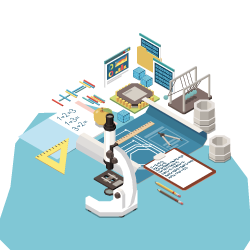Notes from the university professor...

Dr. Stephen L. Jacobs
Creativity
26
Q&A for learning and working in the world of science, technology, engineering and mathematics (STEM)
Dear Professor,
Thank you for your interesting ideas for preparing for life and study at university, especially for those of us who hope to pursue a career in science or engineering. What can we do to better prepare ourselves for finding a job after graduation ?
My regards and appreciation,
In fact, preparing yourself for the giant leap into university studies is hard. Even harder is the exciting prospect of entering the world of professional practice and business. I will share with you below a “checklist” that may help you prepare for the job market.
- Most young students have many ideas or dreams about the type of work or career they propose to prepare for in school.. Identify the job description for the specific type of work you would like to do. You may be surprised at what you find in the official job description of the company.
-Meet professionals in the field. Most will be happy to share ideas about preparing for their career. What you should and shouldn't do.
- Join as a member of the professional organization(s) to which practitioners in your field of interest belong. Most of these organizations welcome students at the beginning of their careers. Be sure to attend their conferences and professional meetings. You will soon learn the ins and outs of the professions and how to be a professional in their world.
- Keep fit.
- Practice speaking clearly and accurately.
- Master the art of body language.
There are two skills that top the list for preparing for a STEM career:
1. Write well.
2. Creative thinking.
These two skills are as essential to a future STEM career as your front teeth are to a smile.
Writing:
There is no quick and easy way to become an effective writer. It takes practice and focused energy to master clear and effective written communication. Many students are intimidated by the importance of writing proficiency. So, here is a thought to help you get started.
There is a wonderful book that many young science and engineering students praise for its clear advice, flow, and warmth, so I keep a copy on the bookshelf near my desk.
“On Writing Well” by William Zinsser has sold millions of copies worldwide. Zinsser was a Yale professor who mentored science and engineering students and others who needed to improve their nonfiction writing skills. I suggest you read Zinsser’s book and use its principles throughout your college career. Your writing skills will grow exponentially.
To be a creative thinker:
It’s easy to see why creativity is so essential for scientists and engineers. We can find ourselves falling into the trap of focusing only on the qualitative and quantitative process that we might bring to the job market.
You may be wondering, “How can I help myself become more creative?”
Should I study art and literature along with my math and science curriculum?
-Absolutely! But, there is a special “trick” I learned that helps science and technology students spark creative thinking. By following the counterintuitive model that all scientists use to formulate ideas. For example, a scientist might be stuck on a problem...
What makes this thing work? If nothing comes to mind that might turn his thinking to the question: What's stopping this from working?!, perhaps?
Applying this idea to creative thinking: How do I become a creative thinker... or what's stopping me from becoming a creative thinker?
Functionalism is one of the most important factors contributing to a student's ability to initiate creative thinking. It is often referred to as a cognitive bias, where a person looks at an object or process and restricts it to its original or traditional use.
The traditional use of a teacup is to serve tea. However, I think you can come up with at least 25 more uses for a teacup. Some of these uses can be quite creative.
Did you benefit from the information provided on this page?
visitors liked this page



